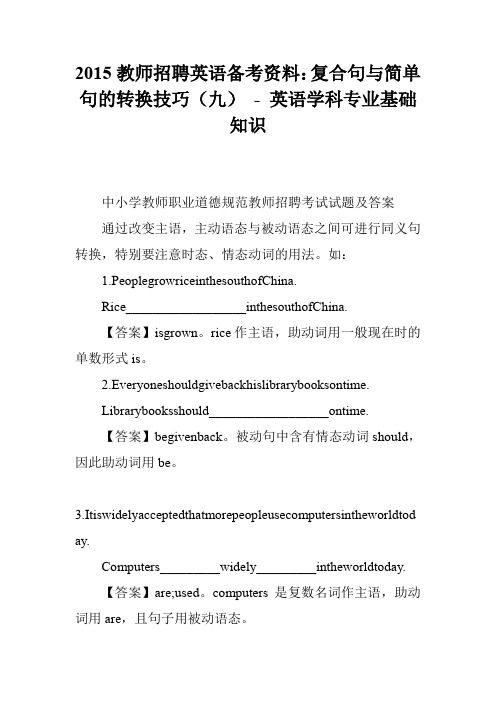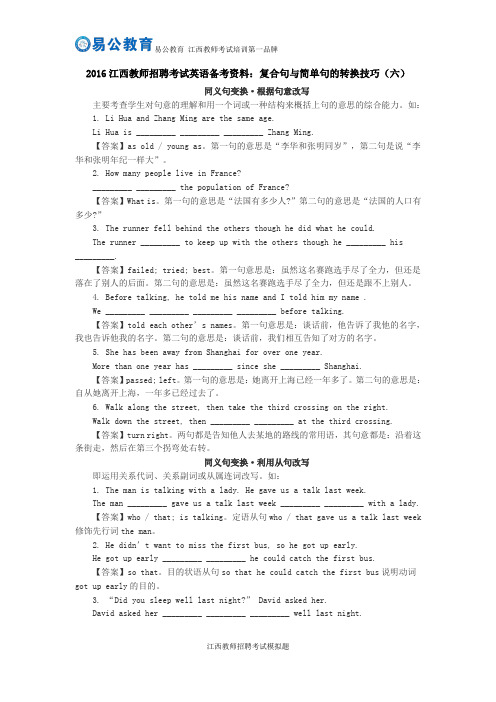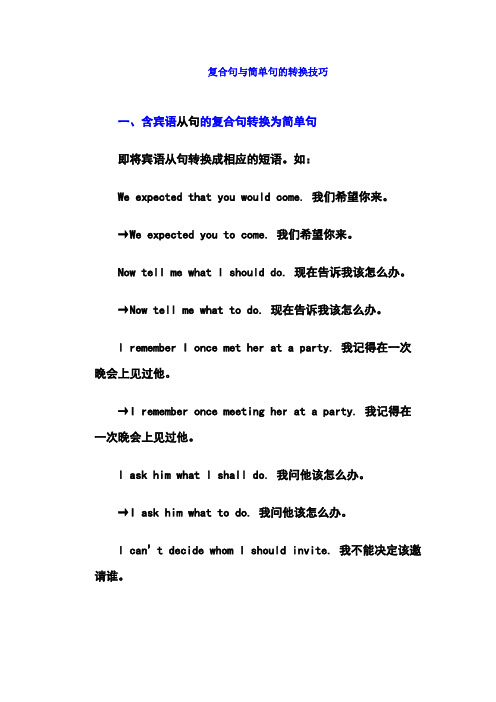2016江西教师招聘考试英语备考资料:复合句与简单句的转换技巧(九)
- 格式:doc
- 大小:109.50 KB
- 文档页数:2

句型转换方法总结英语中,为了避免语句单一化,我们常常可以用不同的句型表达相同的含义。
把一种结构的句子改为另一种结构来表达同样的意思,我们称之为句型转换。
适当了解句型转换的方式可以丰富我们的语言表达能力,从而使语言更精确、更生动。
一、复合句转换成简单句1. so ... that 句型中,当that从句是肯定形式时,可以转换成enough ... to 句型;当that从句是否定形式时,可以转换成too ... to 句型。
当主句与从句的主语不一致时,可以由介词for引出不定式所表示动作的执行者或承受者。
如:He was so old that he could go to school by himself.→He was old enough to go to school by himself.It was so bright in the room that his mother could be operated on.→It was brigh t enough in the room for his mother to be operated on.It was so dark that he couldn’t see the faces of his companions.→It was too dark for him to see the faces of his companions.2. in order that引导的目的状语从句可以转换成in order (not) to结构;so that引导的目的状语从句可以转换成so as (not) to结构。
当主句与从句的主语不一致时,in order (not) to或so as (not) to后接不定式的被动式。
如:They set out early in order that they could arrive at the station in time.→They set out early in order to arrive at the station in time.I did this so that I might have a couple of weeks to prepare my report.→I did this so as to have a couple of weeks to prepare my report.Speak clearly so that they may understand you.→Speak clearly so as to be understood by them.3. if引导的条件状语从句有时可转换为in case of短语。

2015教师招聘英语备考资料:复合句与简单句的转换技巧(九)- 英语学科专业基础知识中小学教师职业道德规范教师招聘考试试题及答案通过改变主语,主动语态与被动语态之间可进行同义句转换,特别要注意时态、情态动词的用法。
如:1.PeoplegrowriceinthesouthofChina.Rice__________________inthesouthofChina.【答案】isgrown。
rice作主语,助动词用一般现在时的单数形式is。
2.Everyoneshouldgivebackhislibrarybooksontime.Librarybooksshould__________________ontime.【答案】begivenback。
被动句中含有情态动词should,因此助动词用be。
3.Itiswidelyacceptedthatmorepeopleusecomputersintheworldtod ay.Computers_________widely_________intheworldtoday.【答案】are;used。
computers是复数名词作主语,助动词用are,且句子用被动语态。
4.Wemustkeepthenoiselevelunder50dbs(分贝).Thenoiselevelmust__________________under50dbs.【答案】bekept。
被动句中含情态动词must,因此助动词用be。
5.Dotheygrowriceinautumn?riceinautumn?【答案】Is;grown。
不可数名词rice作主语,助动词用单数is,一般疑问句的助动词置于句首。
6.Wecallmathsthelanguageofscience.Maths__________________thelanguageofscience.【答案】iscalled。
主语maths虽然是以s结尾,但并不是名词的复数,因此助动词仍用单数is。

2016江西教师招聘考试英语备考资料:复合句与简单句的转换技巧(六)同义句变换·根据句意改写主要考查学生对句意的理解和用一个词或一种结构来概括上句的意思的综合能力。
如:1. Li Hua and Zhang Ming are the same age.Li Hua is _________ _________ _________ Zhang Ming.【答案】as old / young as。
第一句的意思是“李华和张明同岁”,第二句是说“李华和张明年纪一样大”。
2. How many people live in France?_________ _________ the population of France?【答案】What is。
第一句的意思是“法国有多少人?”第二句的意思是“法国的人口有多少?”3. The runner fell behind the others though he did what he could.The runner _________ to keep up with the others though he _________ his_________.【答案】failed; tried; best。
第一句意思是:虽然这名赛跑选手尽了全力,但还是落在了别人的后面。
第二句的意思是:虽然这名赛跑选手尽了全力,但还是跟不上别人。
4. Before talking, he told me his name and I told him my name .We _________ _________ _________ _________ before talking.【答案】told each other’s names。
第一句意思是:谈话前,他告诉了我他的名字,我也告诉他我的名字。
第二句的意思是:谈话前,我们相互告知了对方的名字。
5. She has been away from Shanghai for over one year.More than one year has _________ since she _________ Shanghai.【答案】passed; left。

复合句与简单句的转换技巧一、含宾语从句的复合句转换为简单句即将宾语从句转换成相应的短语。
如:We expected that you would come. 我们希望你来。
→We expected you to come. 我们希望你来。
Now tell me what I should do. 现在告诉我该怎么办。
→Now tell me what to do. 现在告诉我该怎么办。
I remember I once met her at a party. 我记得在一次晚会上见过他。
→I remember once meeting her at a party. 我记得在一次晚会上见过他。
I ask him what I shall do. 我问他该怎么办。
→I ask him what to do. 我问他该怎么办。
I can’t decide whom I shou ld invite. 我不能决定该邀请谁。
→I can’t decide whom to invite. 我不能决定该邀请谁。
二、含状语从句的复合句转换成简单句即将状语从句转换成状语短语。
如:He can’t come because he is ill. 他因病不能来。
→He can’t come because of his illness. 他因病不能来。
Turn off the light before you leave. 离开前请关灯。
→Turn off the light before leaving. 离开前请关灯。
He went home after he finished his work. 他做完工作后就回家了。
→He went home after finishing his work. 他做完工作后就回家了。
He was so angry that h e couldn’t speak. 他气得话都说不出来。

复合句与简单句的转换技巧一、含宾语从句的复合句转换为简单句即将宾语从句转换成相应的短语。
如:We expected that you would come. 我们希望你来。
→We expected you to come. 我们希望你来。
Now tell me what I should do. 现在告诉我该怎么办。
→Now tell me what to do. 现在告诉我该怎么办。
I remember I once met her at a party. 我记得在一次晚会上见过他。
→I remember once meeting her at a party. 我记得在一次晚会上见过他。
I ask him what I shall do. 我问他该怎么办。
→I ask him what to do. 我问他该怎么办。
I can’t decide whom I should invite. 我不能决定该邀请谁。
→I can’t decide whom to invite. 我不能决定该邀请谁。
二、含状语从句的复合句转换成简单句即将状语从句转换成状语短语。
如:He can’t come because he is ill. 他因病不能来。
→He can’t come because of his illness. 他因病不能来。
Turn off the light before you leave. 离开前请关灯。
→Turn off the light before leaving. 离开前请关灯。
He went home after he finished his work. 他做完工作后就回家了。
→He went home after finishing his work. 他做完工作后就回家了。
He was so angry that he couldn’t speak. 他气得话都说不出来。

复合句与简单句的转换技巧Revised as of 23 November 2020复合句与简单句的转换技巧?一、含宾语的复合句转换为简单句即将宾语转换成相应的短语。
如:We expected that you would come. 我们希望你来。
→We expected you to come. 我们希望你来。
Now tell me what I should do. 现在告诉我该怎么办。
→Now tell me what to do. 现在告诉我该怎么办。
I remember I once met her at a party. 我记得在一次晚会上见过他。
→I remember once meeting her at a party. 我记得在一次晚会上见过他。
I ask him what I shall do. 我问他该怎么办。
→I ask him what to do. 我问他该怎么办。
I can’t decide whom I should invit e. 我不能决定该邀请谁。
→I can’t decide whom to invite. 我不能决定该邀请谁。
二、含状语的复合句转换成简单句即将状语转换成状语短语。
如:He can’t come because he is ill. 他因病不能来。
→He can’t come because of his illness. 他因病不能来。
Turn off the light before you leave. 离开前请关灯。
→Turn off the light before leaving. 离开前请关灯。
He went home after he finished his work. 他做完工作后就回家了。
→He went home after finishing his work. 他做完工作后就回家了。
He was so angry that he couldn’t speak. 他气得话都说不出来。
2016江西教师招聘考试英语备考资料:复合句与简单句的转换技巧(五)句型变换复习·主动语态变被动语态被动语态由“助动词+及物动词的过去分词”构成。
不同时态的被动语态的差异主要体现在助动词be的变化上,同时助动词be还要在人称和数上与主语保持一致。
在将主动语态变为被动语态时,可按以下三个步骤:a. 把主动语态的宾语变为被动语态的主语。
b. 把谓语变成被动结构(be+过去分词) ,并根据被动语态句子里的主语的人称和数以及原来主动语态句子中动词的时态来决定be的形式。
c. 把主动语态中的主语放在介词by之后作宾语,将主格改为宾格。
在无须说明动作的执行者或只强调动作的承受者时,by短语可以省略。
例如:All the people laughed at him. →He was laughed at by all people.They make the bikes in the factory. →The bikes are made by them in the factory 含有双宾语的主动句改为被动句时,应将其中一个宾语改为被动结构的主语,另一个宾语仍保留在原处。
一种情况是把间接宾语(指人)变为主语,直接宾语(指物)不变;另一种情况是把直接宾语(指物)变为主语,间接宾语(指人)不变,这时,间接宾语前通常加介词to,有时加for。
例如:My father gave me a new book on my birthday.→I was given a new book (by my father) on my birthday. (间接宾语作了主语) →A new book was given to me (by my father) on my birthday. (直接宾语作了主语)含有情态动词的主动句变成被动句时,由“情态动词+be+过去分词”构成,原来带to 的情态动词变成被动语态后,to 仍要保留。
复合句与简单句的转换技巧————————————————————————————————作者:————————————————————————————————日期:复合句与简单句的转换技巧一、含宾语从句的复合句转换为简单句即将宾语从句转换成相应的短语。
如:We expected thatyou would come.我们希望你来。
→Weexpected you to come. 我们希望你来。
Now tellme what Ishould do. 现在告诉我该怎么办。
→Now tell me what todo.现在告诉我该怎么办。
I remember I once met her ata party.我记得在一次晚会上见过他。
→Iremember once meetingher ataparty. 我记得在一次晚会上见过他。
I ask himwhat I shall do. 我问他该怎么办。
→I ask him whatto do.我问他该怎么办。
I can’tdecide whom I should invite.我不能决定该邀请谁。
→Ican’t decide whomtoinvite.我不能决定该邀请谁。
二、含状语从句的复合句转换成简单句即将状语从句转换成状语短语。
如:He can’tcome becauseheis ill. 他因病不能来。
→He can’tcome because of hisillness. 他因病不能来。
Turn off the light before you leave.离开前请关灯。
→Turn off thelightbefore leaving. 离开前请关灯。
He went home afterhefinished his work.他做完工作后就回家了。
→Hewenthomeafter finishing his work. 他做完工作后就回家了。
He wasso angry thathecouldn’t speak.他气得话都说不出来。
句子拓展从简单句到复合句的转化句子是语言表达的基本单位,而句子的拓展与丰富不仅可以使文章更具表达力和变化性,还可以增强句子之间的逻辑关系。
简单句是由一个主语和一个谓语构成的句子,而复合句则由一个主句和一个或多个从句构成。
在句子拓展的过程中,我们可以使用各种手段,如添加连词、转换句子成分和重组句子顺序等方法,将简单句逐渐转化为复合句,使句子更加精彩、丰富和有层次。
一、从简单句到复合句的转化方法1. 添加连词:"而且"、"因此"、"然而"、"但是"等连词可以用来连接两个简单句,使其成为一个复合句。
例如:- 简单句:他很聪明。
他很懒。
- 复合句:他很聪明,但是他很懒。
2. 转换句子成分:将简单句中的一个成分转换为从句,使句子变为复合句。
例如:- 简单句:他是一位优秀的学生。
- 复合句:他是一位学习成绩优秀的学生。
3. 插入定语从句:用定语从句来修饰主句的主语或宾语,从而增强句子的修饰和描述能力。
例如:- 简单句:这是一个好消息。
- 复合句:这是一个我们等待已久的好消息。
4. 使用关联词:使用关联词(如:因为、所以、如果等)引导从句,使句子的表达更加清晰和逻辑。
例如:- 简单句:他很善良。
- 复合句:因为他很善良,所以他受到了大家的爱戴。
二、举例说明句子拓展的过程1. 连词的使用简单句:他很勤奋。
他成绩优秀。
复合句:他很勤奋,因此他成绩优秀。
2. 转换句子成分简单句:这件事情很重要。
复合句:重要的是这件事情需要我们去关注。
3. 插入定语从句简单句:这是一本有趣的书。
复合句:这是一本我们都喜欢读的有趣的书。
4. 关联词的使用简单句:她很聪明。
复合句:如果她很聪明,那么她一定能取得成功。
从以上例子可以看出,通过使用不同的方法和手段,我们可以将简单句转化为复合句,使句子更具表达力和逻辑性。
这种句子的拓展不仅可以增强文采,还可以提高文章质量,让读者对文章内容更加深入的了解和体会。
英语中复合句与简单句的转换举例1. 含宾语从句的复合句转换为简单句。
即将宾语从句转换成相应的短语:We expected that you would come. 我们希望你来。
→We expected you to come. 我们希望你来。
Now tell me what I should do. 现在告诉我该怎么办。
→Now tell me what to do. 现在告诉我该怎么办。
I remember I once met her at a party. 我记得在一次晚会上见过他。
→I remember once meeting her at a party. 我记得在一次晚会上见过他。
I ask him what I shall do. 我问他该怎么办。
→I ask him what to do. 我问他该怎么办。
I can't decide whom I should invite. 我不能决定该邀请谁。
→I can't decide whom to invite. 我不能决定该邀请谁。
2. 含状语从句的复合句转换成简单句。
即将状语从句转换成状语短语:He can't come because he is ill. 他因病不能来。
→He can't come because of his illness. 他因病不能来。
Turn off the light before you leave. 离开前请关灯。
→Turn off the light before leaving. 离开前请关灯。
He went home after he finished his work. 他做完工作后就回家了。
→He went home after finishing his work. 他做完工作后就回家了。
He was so angry that he couldn't speak. 他气得话都说不出来。
2016江西教师招聘考试英语备考资料:复合句与简单句的转换技巧(九)
同义句变换·利用语态改写
通过改变主语,主动语态与被动语态之间可进行同义句转换,特别要注意时态、情态动词的用法。
如:
1. People grow rice in the south of China.
Rice_________ _________ in the south of China.
【答案】is grown。
rice作主语,助动词用一般现在时的单数形式is。
2. Everyone should give back his library books on time.
Library books should _________ _________ on time.
【答案】be given back。
被动句中含有情态动词should,因此助动词用be。
3. It is widely accepted that more people use computers in the world today.
Computers _________ widely _________ in the world today.
【答案】are; used。
computers是复数名词作主语,助动词用are,且句子用被动语态。
4. We must keep the noise level under 50dbs(分贝).
The noise level must _________ _________ under 50dbs.
【答案】be kept。
被动句中含情态动词must,因此助动词用be。
5. Do they grow rice in autumn?
rice in autumn?
【答案】Is; grown。
不可数名词rice作主语, 助动词用单数is,一般疑问句的助动词置于句首。
6. We call maths the language of science.
Maths _________ _________ the language of science.
【答案】is called。
主语maths虽然是以s结尾,但并不是名词的复数,因此助动词仍用单数is。
同义句变换·利用反义词改写
用反义词或词组加上否定词表达与原句相同的意思,主要考查学生对反义词、词组的积累和换位思维的能力。
如:
1. The boy lent a story-book to Tom just now.
Tom _________ a story-book _________ the boy just now.
【答案】borrowed; from。
borrow…from意为“从……借来”;而lend…to意为“向……借出”,两个词组正好为一组反义词组,当句子的主语变化时,两个词组可以进行互换。
2. The factory is not far from here. It only takes you ten minutes by bike.
The factory is _________here. It’s only ten minutes’_________.
【答案】near; bike-ride。
not far的意思是“不远,近”,可用形容词near与之转换。
3. I think music is less interesting than P.E.
I _________think music is _________interesting than P.E.
【答案】don’t; more。
less interesting的意思是“没有 / 不及……有趣”,与之相反more interesting的意思是“(比) ……更有趣”。
语言现象“否定的转移”要求将think后面宾语从句中的否定形式转移到think 上。
4. The bike under the tree is different from this one.
The bike under the tree isn’t the _________ _________this one.
【答案】same as。
the same as意为“与……相同”,而反义词组 be different from 意为“与……不同”。
同义句变换·利用同义词改写
用同义词或同义词组对原句中的某些词或词组进行替换,注意替换后的词或词组的词形变化要与句子其他成分相适应。
如:
1. They could see icebergs here and there.
They could see icebergs _________.
【答案】everywhere。
everywhere与here and there都有“到处”之意。
2. Mrs Green always takes good care of the children in the school.
Mrs Green always _________ _________ the children well in the school.
【答案】looks after。
take good care of 与look after…well都有“好好照顾”之意。
3. Lin Tao is good at physics.
Lin Tao_________ _________ in physics.
【答案】does well。
be good at与do well in都有“在……(方面) 做得好,擅长于……”之意。
4. I like Backstreet Boys. But he likes F4 better.
He_________ F4_________ Backstreet Boys.
【答案】prefers, to。
词组prefer A to B 意为“选择A(而不选择B);比起 B 来,更喜欢A”。
5. Mother is ill. Send for a doctor right away.
Mother is ill. Send for a doctor _________ _________.
【答案】at once。
right away与at once 都有“马上”之意。
6. They enjoyed themselves at the garden party.
They _________ _________ _________ _________ at the garden party.
【答案】had a good time。
enjoy oneself同have a good time都有“玩得很高兴,愉快”之意。